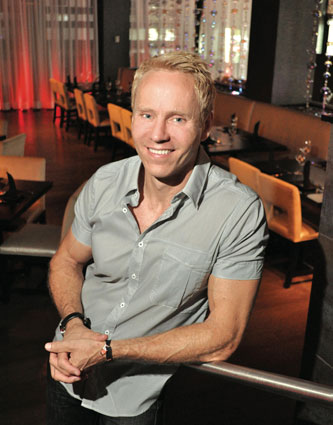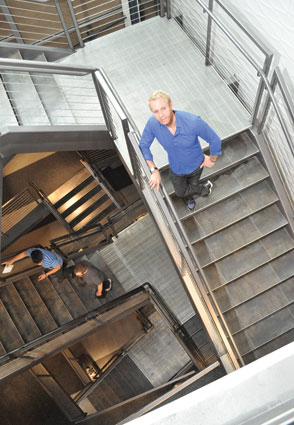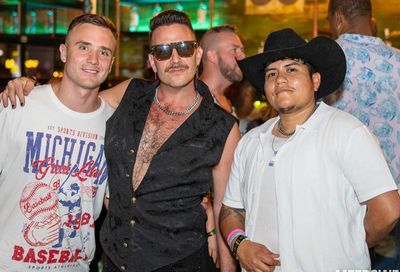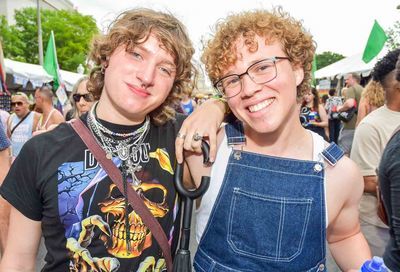Urban Empire
How David von Storch Took his Career from Corporate Closet to Local Lifestyle Powerhouse
If gay D.C. has an ”A-list,” David von Storch is certainly on it.
Most obviously, he’s got the looks and the money. Just ask Men’s Health, who in April placed him on the magazine’s ”Fiscally Fit” list of ”masters of the universe who also treat their bodies like a temple.”

David von Storch
With his four Vida Fitness gyms – and a fifth on its way – there’s good reason for the chiseled body and ample portfolio. But there’s also Capitol City Brewing Company, Bang Salon, Aura Spa and his new Penn Quarter restaurant, 901.
Then there’s the pedigree. ”Von Storch” may not be a familiar name in D.C. beyond this well-known David, but back in his childhood corner of Pennsylvania, it marks more than just people. Scranton’s Von Storch Avenue, for example, may not be a grand thoroughfare, but there it is nonetheless.
For those who have never set foot in any corner of von Storch’s local empire, there’s a chance they may have caught a clip of the reality show he hopes to launch, Complicated Order, capturing the day-to-day of what is certainly an A-list life.
But like anybody, von Storch is more than a persona. He’s a man who began his career in the closet. Moving to Washington after earning his MBA at Harvard Business School, von Storch found himself fending off whispers about his sexual orientation at work in the 1980s. One co-worker, a friend, confided how he wouldn’t be able to work with a gay person. That environment helped push von Storch down a more independent path, founding Urban Adventures Companies in 1986, and opening Dakota Nightclub and Montana Café in Adams Morgan. From there, his empire grew.
The excitement of new business ventures soon took a frightening backseat, when von Storch learned he was HIV-positive. Thriving despite an infection of more than two decades has made von Storch a sort of role model. His high-profile life and businesses, however, have also made him something of a target. Friction between von Storch and Doug Jefferies, owner of Results, The Gym, aired publicly. It was sparked when von Storch decided to reclaim space housing a Results in his property at 1612 U St. NW so that he could use it for his latest Vida.
[CORRECTION: The above paragraph originally referred to Jefferies as a business partner of von Storch. The two were not partners in the same business; Jefferies rented the U Street space from von Storch. The sentence was edited to more accurately characterize the relationship.]
However one defines that ”A,” it can stand for ”accomplishment.” While discussion of his career gives the impression that von Storch has not reached some plateau that will allow him the luxury of settling, he knows he’s made the right decisions for himself. He knew even before he opened that first venue.
”It wasn’t really the success of the business that defined whether I’d made the right decision,” says von Storch, sitting in 901 on a summer afternoon, remembering the jump from corporate closet – and security – to business ownership. ”It was so liberating for me to be who I was. Before I knew I was successful, I knew I had done the right thing. There was no regret, from the moment I left.”
Talking to von Storch, more than 20 years later, sitting in one of his newest enterprises, it’s hard to imagine he could have ever had a second thought.
METRO WEEKLY: Where did you come from? I have no idea where you were born, any of that.
DAVID VON STORCH: I grew up in northeastern Pennsylvania, outside of Scranton, and went to high school in western Massachusetts, a place called Deerfield Academy. Then I went to the University of North Carolina. Lived in New York for a couple of years. Went to business school in Boston, and then moved to Washington, D.C.
MW: Deerfield Academy? Sort of an uptight, traditional prep school?
VON STORCH: Not uptight. It was an extraordinary experience for me. I was very lucky to have it. It is one of the elite New England private prep schools. It wasn’t uptight at all. It was very supportive, eye-opening, educational. I enjoyed it very much.
MW: What was your home-life like back in Pennsylvania?
VON STORCH: Very traditional, two-parent household. Mom was at home, Dad worked. I had an older brother, an older sister and a younger sister. I was right in the middle. We all went to public school through middle school. Most of us went away to prep school for high school, but we were still close to home.
MW: What kind of kid were you? Quiet? Sporty?
VON STORCH: I was the overachiever in class. I don’t know where that comes from. Neither my father nor my mother were berating, overbearing parents. They were really great parents. I had a really great relationship with my mom and dad. I don’t know where that ”achievement gene” comes from, but I was definitely an overachiever.
MW: Were your siblings the same?
VON STORCH: No. Perhaps it was my latent homosexuality. [Laughs.]
MW: All that energy to burn.
VON STORCH: It wasn’t like we were all competing for our parents’ attention. It wasn’t like our parents were driving all the kids to excel. We were all treated and loved individually. I just happened to choose that course.
MW: As you were growing up, when was it that you realized you were gay?
VON STORCH: I was very late to the game. In retrospect, perhaps I was so driven so that I wouldn’t have to look at or explore that part of myself that I perhaps knew at some level was different – and didn’t know how or why. I think the first time I really started to explore my sexuality was after business school, really. I was dating girls.
MW: Were you raised in a pretty conservative home? Or maybe progressive?
VON STORCH: My family is intellectually curious and liberal, but I think when it comes to sex and sexuality, we’re very puritanical. There’s that sort of bifurcation. That New England Puritan strain certainly is part of my family.
MW: Happy to recycle, don’t like to talk about sex?
VON STORCH: Exactly. [Laughs.]
MW: They must know by now.
VON STORCH: Oddly enough, my brother found out when I was 30. I had a party up at my nightclub in Adams Morgan. This shows you how Puritan my lifestyle was: At 30 years old, I’m living in an apartment in Washington without any air conditioning. My employees, knowing how cheap I am, decided to pitch in together and get me an air-conditioning unit. True story.
So there’s this big box in the middle of the room. And my brother came up to surprise me for my birthday. In the room were my core friends, largely gay. When he walked in, he was a little taken aback, wasn’t sure what was going on. My guess is he had more of a sense than I thought he did. And just when I was opening the box, a friend says, ”I bet you hope a hot, young boy pops out.” I looked at my brother and said, ”Well, I guess the cat’s out of the bag on that one.” [Laughs.]
That’s actually how I came out to my brother. I did not ever actually come out to my family. The first time I had a conversation about sexuality with my mom or my dad was when I talked about my HIV status.
MW: With your brother, was he cool about you being gay?
VON STORCH: My brother was much more cool about it than I was, frankly. He was very cool about it.
MW: Did that help you accept yourself?
VON STORCH: Not really. There’s way too much flotsam and jetsam up here [pointing to his head] for anything like that to be helpful.
MW: Talking about your HIV status, you’ve been positive since –
VON STORCH: Forever!
MW: Since the 1980s. You’re sort of the embodiment of ”living well.” That’s your business. Which seems like a big ”fuck you” to HIV. Did being positive have some influence over your career?
VON STORCH: It is fair to say that part of the way I’m wired is that part of my relationship with HIV has never been one of complacency or truly acceptance. Perhaps there is some truth to say that my business, the amount of time I focus on my business and the way I take care of myself is to say that I’m not going to let that part win. I think it’s more that perspective. It’s more of a personal relationship with the virus. I’m not going to let it win.
MW: Looking at the reverse, would your career have been different if you weren’t positive?
VON STORCH: I always tell people that when we look at our challenges and the things that get in the way of our success, the things that define us, if we look at the big pile of b.s. that we carry around with us – and we all have it – my particular bag of b.s. has a really big HIV component. So I can use HIV as something that defines me. I can use it as a reason why I’m this or why I’m that.
Truthfully, I think I am more fundamentally who I am because of who I am. So when you ask me the question, how would my life be different professionally if I hadn’t had HIV, I would say that there was a point in the early ’90s where I was so consumed with surviving that my career did take a backseat. For probably five to eight years of my life, my career definitely took second fiddle. My career might’ve taken a different trajectory if I had been fully engaged in it. But then, I certainly learned things about myself and about life and about perspective, so that perhaps where I would’ve been may not necessarily make me more happy or more successful, ultimately, if I hadn’t gone down that path.
MW: Along that timeline, where does opening Dakota fall in?
VON STORCH: Beforehand. I opened Dakota before I found out, before I was exposed.
MW: You were already geared up to dive into the hospitality/entertainment industry?
VON STORCH: Absolutely.
MW: Was that a scary leap to make?
VON STORCH: The motivation for going into business was a little atypical. I wanted to be who I was – as opposed to having this dream that I wanted to be my own boss. I thought through the consequent possible outcomes of being in business on my own, got my hands around what it would be like to be a complete failure at what I tried to do. I thought I would be okay if it were a complete failure [and] that allowed me, freed me up to be successful. That’s really how I looked at it when I started Dakota. I said, ”How would I be? Would I be okay? What would this be like if this were a failure?” I said, ”You know what? It would be okay. I think I would survive.”

I think that some of us get so petrified and we get frozen by our fears of failure or rejection or whatever they are, and we don’t go there. If we can get past that and understand that that in and of itself is not a reason not to do something, then it frees you up to do what it is that you set out to do. And probably do it better.
MW: Are there fears you still deal with?
VON STORCH: In the day to day, absolutely. Every day, I get out of bed happy that I do what I do, with the people I work with. That’s a real charge for me. But I do not sit back and relax and say, ”Okay, I’ve done enough,” or, ”That’s good.” There is always that sense of pursuing more success, more stability, more security. There’s definitely that. That drives me. Someone might say, ”My gosh, you’re financially secure. That must be a great feeling.” I don’t necessarily feel that way.
Certainly, I get a sense of accomplishment and pride. But I never look at what I’ve done and say, ”Gee, I never thought I would be here,” because I have high expectations for what I can achieve. Quite frankly, I more often fall short of those expectations than exceed them.
MW: I can look at your company on paper, read the list of businesses. But in your own words, describe Urban Adventures.
VON STORCH: Urban Adventures has become a true lifestyle company. That was never a strategic goal of mine. You can understand my business philosophy best by understanding that I went into the Capitol City Brewing Company, the brewpub business, not because I had this affection for beer, but because it was a really great business opportunity.
As that business was successful, it allowed me the financial opportunity to do other things. At that point I started to get involved with things that I really liked to do – in other words, the things that were really fascinating to me as opposed to business opportunities. So fitness and the salon business and the spa business – those things really are interesting to me. But it really started with the fitness business. It did start from that fundamental connection between who I am and my health, which was really such a focus in the early to mid-’90s, to when I first tried to open a gym. That was really more an outgrowth of who I wanted to be.
Now, how did we get from there to here? The growth of the concept of Vida Fitness and Urban Adventures Companies, it’s really more observational than strategic. I saw Vida becoming very successful and Bang Salon becoming very successful. I realized that there is a demographic and a psychographic profile of our customer that is someone that we know. And it is someone that we believe that we have a relationship with. I determined that the best way for me to grow my company was to develop that relationship, a relationship with that psychographic/demographic profile.
MW: I think the first time I came across the term ”psychographic” was reading an interview with you.
VON STORCH: You have demographics: age, sex, sexual orientation. Psychographic is those parts of your psychology. What are you interested in? A demographic is not someone who is passionate about fitness. A psychographic profile is someone who really is passionate about fitness, passionate about taking care of themselves. So a psychographic profile of a customer of ours is not just an age and a sex, but it’s how they think. What are they interested in? What are the interests that they share? It’s wellness and it’s taking care of themselves. But it’s also being successful enough to be able to pamper oneself and to be able to enjoy the fruits of one’s labor.
MW: Are Urban Adventures and David von Storch interchangeable?
VON STORCH: I have an investor group in Capitol City Brewing Company, and I have a partner in Bang Salon, and I have a couple of partners in Vida. I report to them. I have a responsibility to them. I view them as one of a group of stakeholders: It’s the ownership group, the employee group and the customer group. And they all have a stake in the business. But I don’t have quarterly meetings, don’t have annual meetings. What I do is send out a quarterly financial statement in an email that summarizes for everybody what we’ve accomplished during the quarter, and what we hope to accomplish in the next quarter. And I should do that whether I have investors or not. That’s the kind of regular analysis that we should be performing whether or not we had an investor group.
MW: What about the reality show Complicated Order? What was your motivation for that?
VON STORCH: There were two motivations. I’m sufficiently successful that to do it simply for financial reasons wasn’t enough. But, having said that, I thought it was a great way for us to accelerate the development of the lifestyle company and the lifestyle brand. And Complicated Order was, quite crassly, really a terrific vehicle to get us exposure and to get people aware and interested and involved in what we wanted to do as a business.
Part of it also was – whether this is accurate or not – I think, for whatever reason, I play somewhat of a role model for many people who have had a challenge in their life, something that’s really gotten in the way of their own success. The easiest one is the HIV story. There is a correlation to many people when they confront a situation that is not of their making, not of their choosing, but that can really change the course of your life, really be an impediment to them being successful, however they define success.
So Complicated Order was a way both to grow my business and for me to offer myself as a role model for someone to say, ”Gee, that guy’s been through a lot and he can do it. And I can do it, too.”
MW: Do people come to you often? Do you get unsolicited emails for advice, that sort of thing?
VON STORCH: All the time.
MW: What sorts of things are people asking you about? ”What’s the secret to your success?”
VON STORCH: I get that constantly. And I constantly get people who contact me about, ”Hey, I was reading your story and it’s really inspirational. And I’m in this situation and I’d like to understand how you got through it.”
I was being interviewed for The Washington Post last year and, literally, as I was in the interview someone called me up and said, ”Listen, a friend of mine has just become positive.” It was a good friend of mine [who called], and he said, ”He’s really struggling.” That happens. I guess I represent, for better or worse, someone that people can relate to, because I’m successful, but not so successful that I’m unapproachable, or that people can relate to my success. They also understand, because I’ve been open about it, my journey and how difficult it’s been. I think people relate to the sort of genuineness of the discussion about my journey.
MW: That high profile, that spotlight, living a life that a lot of people probably want, also puts you in the line of fire.
VON STORCH: Absolutely. It sure does.
MW: Do you get as much flak as you get people asking you for advice?
VON STORCH: No, I don’t. I’ve been lucky in that the personal criticism I’ve received over the years, the professional criticism I’ve received, has been very little. We all get the sniping, that’s just part of life.
But I don’t live my life so much differently than people who aren’t my friends, who may not understand me. I mean, I go to the gym five days a week. If you really have an issue with Vida Fitness, you can walk up to me. I don’t live in an ivory tower. I’m pretty accessible. I think that accessibility does keep the nattering conversation from getting too far. Now, there have been a couple instances…. I’m sure we’ll talk about it.
MW: Well, with the transformation of 1612 U St., people do say, ”Oh, David von Storch and Doug Jefferies.” If there’s anything particular you want to say….
VON STORCH: What I will say – and this is where I was misquoted, so I’m certainly glad [you are recording this interview] – every business relationship has its ups and downs. That particular relationship, the downs were particularly more pronounced than other relationships that I’ve had. And what I will take away is this: When someone criticizes me for my business judgment, it’s pretty easy for me to take. When someone criticizes me in the public square, it’s harder. What I learned from that experience was it’s a little naive to think that one’s business, the way I conduct myself, the way I carry my business, will inoculate me from personal criticism. I learned that when someone makes an accusation, no matter how unfounded, you have to respond. I don’t respond, generally, to that whole chapter in that part of my life. Rather than commenting on what other people do, I’ll say that my failing was probably not to say anything. By not correcting the record, I think I suffered some professional damage, and I look at that as my own fault.
MW: Tell me about that particular building, 1612 U St. NW. It’s like a gay D.C. landmark.
VON STORCH: I’m very proud of that. As we talked about, in the early ’90s the primary focus of my life was my health, and my career was definitely sidelined. At that point, I was looking at real estate. One of the things I wanted to create was a gay community center that wasn’t nonprofit based, but based in the world that I live in. The world that I live in is profit based. It’s young gays and young lesbians being entrepreneurs, creating things, doing things that they’re passionate about, in the community where they live. And there was no place for that, and that’s sort of where I come from. When I say ”community center,” that’s what I’m talking about. Because of the way I’m wired, I think about business. I think, why can’t we have a place where we can have incubator offices for gay-friendly and gay businesses, so that they can literally walk across the hall and get graphic design, or get somebody who does marketing or someone who’s in IT, and create these businesses where there’s really some cross-fertilization? And you know what? They really enjoy being there because they have this sort of shared bond that they don’t have in a normal office building. And that’s really what we created.
There was the gym, which, the story is true, I wanted to start the gym. I designed it, then realized I just had too much on my plate and I couldn’t do it all. So I ended up being a landlord in that. That was only about two-thirds of the building. The rest of the building, the whole top floor, was incubator offices. There was really an authenticity to what that building provided. With Vida coming in, we grew the building enough, but we still have room to put those incubator offices in, which we’re going to do next year. It’s important to me. I just don’t have the funds to quite finish it. [Laughs.] That’s an honest answer. I’ll have to wait until next year to finish the office-suite part. The for-lease signs will go up in a week or so.
MW: And the Penthouse Pool Club?
VON STORCH: I guess if there was a sort of selfish indulgence of mine in this project, it’s that. I love the city. I love living in the city. But there is no place where in a weekend in the summer, or spring or early fall, we can just go with our friends and hang out by the pool. There are pools at hotels, but if the hotel is booked or if there’s a private party, you can’t go. Some apartments have pools, but you can’t get a drink, there’s no place to get food, and sometimes it’s noisy with the kids jumping around. I love kids, but the pool environment to me is a place to relax. The Penthouse Pool Club is really designed to be a resort in the city for people who want to get away from the hustle and bustle and the craziness of the city, without leaving the city.
MW: When you’re stressed, do you jump on a flight to Miami? Meditate? Jump on a treadmill?
VON STORCH: I work out. I’ve always been lucky that I sleep really well. I work out. I sleep. And I try not to get too crazy.
We all like to blow off steam in the community. We all like to go to clubs and party – a lot of us. I certainly do. But when I’m in those periods of stress, the worst thing I can do is go to Miami and get crazy for a weekend. I need to be focused. So the answer is I go to the gym. People think I’m unapproachable at the gym, but if you come up to me I’ll say hello. But when I’m working out, I’m really working out. I find that I process a lot of my work angst while I’m working out. So when I leave the gym, I’m in a really good mood.
MW: When Ben Cohen was in town, he did some training at Vida, and there was an event with him at 901 including the Human Rights Campaign. And the largest election-results event I saw in 2008 was the HRC event at Capitol City Brewing. Do you have a special relationship with HRC?
VON STORCH: I’ve always been a big supporter of HRC. Those guys get out of bed every day to fight the battles that I don’t want to fight, that need to be fought. I think we’ve reached the point with HIV care and the Ryan White Act and [the AIDS Drug Assistance Program] … that the longest battle, the hardest struggle, really is with true equality. And that’s what HRC’s focus is. I’ve been a supporter for a long time. I think they do really terrific work. Because they are really high-profile, they get a lot of flak as well. I understand it, but I sit squarely on the side of supporting HRC. They do great work.
In the mid-’90s, I sat on the board of the Gay and Lesbian Victory Fund. That experience taught met that I am much more suited to help raise money and help organizations to be effective, rather than leading them organizationally. Organizations need people like me. Organizations need people to go down to the White House and carry a sign. I think my most effective role is to be a successful businessman and financially support the organizations.
MW: How would you define this stage of your life, whether it’s this week, this decade, however you would frame it?
VON STORCH: I’m fully engaged. I’m able to take advantage of the experience I’ve had, the mistakes that I’ve made. I’m still curious enough and strong enough and interested enough to try new things and take risks. My body and my mind haven’t atrophied to the point where I can’t do things that I used to do. Certainly, I can’t stay up as late as I used to. Other than that, I’m fully engaged and really enjoying that.
Support Metro Weekly’s Journalism
These are challenging times for news organizations. And yet it’s crucial we stay active and provide vital resources and information to both our local readers and the world. So won’t you please take a moment and consider supporting Metro Weekly with a membership? For as little as $5 a month, you can help ensure Metro Weekly magazine and MetroWeekly.com remain free, viable resources as we provide the best, most diverse, culturally-resonant LGBTQ coverage in both the D.C. region and around the world. Memberships come with exclusive perks and discounts, your own personal digital delivery of each week’s magazine (and an archive), access to our Member's Lounge when it launches this fall, and exclusive members-only items like Metro Weekly Membership Mugs and Tote Bags! Check out all our membership levels here and please join us today!























